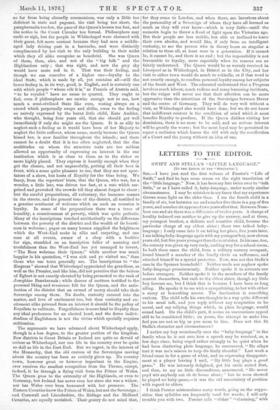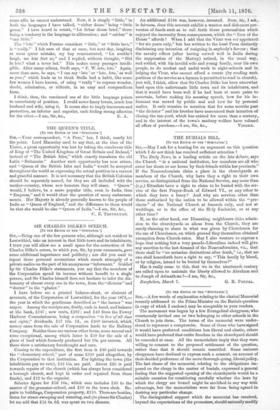LETTERS TO THE EDITOR.
SWIFT AND STELLA'S "LITTLE LANGUAGE."
[TO THE EDITOR OF THE EPROTATOR1
Szu,—I have just read the first volume of Forster's "Life of Swift," and find he lays some stress on the right translation of the "little language." Now, it has been my fate twice over to "talk little," or as I have called it, baby-language, under nearly similar circumstances. I may be mistaken in my fancy that my experience- throws some light on the older time. I am the fourth child in a family of six, but between me and number five there is a gap of five years, and number six appeared two years after that. Between Num- bers one and six there was a difference of twelve years. A change of locality induced our mother to give up the nursery, and at three, my youngest brother, a delicate and sensitive child, became the particular charge of my eldest sister ; these two talked baby- language ; I only came into it on taking her place, five years later. I am talkingbaby-language again with my youngest boy, now eleven years old, but five years younger than the next sister. In his case, too, the nursery was given up very early, making way for a school-room. In both these cases the child, from a solitary nursery occupant, found himself a member of the family circle on sufferance, and attached himself to a special protector. Now, was not this Stella's case in the Spencer household? Neither uncle nor nephew spoke baby-language promiscuously. Neither spoke it to servants nor before strangers. Neither spoke it to the members of the family nearest themselves, but each to the eldest sister, though my little boy favours me, but I think that is because I have been so long, ailing. He speaks it to me with a sympathising, to her with either a saucy or beseeching accent. The fascination is something curious. The child tells his own thoughts in a way quite different to his usual talk, and you reply without any temptation to be moral, and say rallying things which, in plain language, would sound hard. On the child's part, it seems an unconscious appeal still to be considered little ; on yours, the attempt to make him feel you are not so big as you seem to him. Does not this fit Stella's character and circumstances?
I notice my boy occasionally uses the " baby-language " in the family when he is not sure bow a speech may be received, as, a few days since, being urged rather strongly to be quiet when ho had been chattering plain language, he announced, " Me allays tort it was me's misson to teep dis fanily cheerful." Last week a. friend came in for a game of whist, and on expressing disappoint- ment at a player leaving I said, "My little boy plays a good game." He was intensely delighted, got his cards sorted first, and then, to my no little discomfiture, announced, "Me never payd wiv anybody out oh de house afore ; " but he soon showed he played no baby-game,—it was the old uncertainty of position with regard to elders.
I think Forster mistranslates many words, going on the suppo- sition that syllables are frequently used for words; I will only trouble you with two. Forster calls " richar " "charming," with
some affix he cannot understand. Now, it is simply "little," in both the languages I have talked, " richar doose" being "little goose." I have heard in retort, " Lu lichar doose lutef," there being a tendency in the language to alliteration; and " michar " is "my little."
The " lete " which Forster considers "little," or "little love," is " really." I felt sure of that at once, but next day, laughing at some queer mistake, my boy remonstrated, " Lu souldn't laugh, me lete fort so," and I replied, without thought, "Did in lete? what a tever lad." This makes many passages intelli- gible. After many adieux, Swift says, " F. W. lete, lete." Again, more than once, he says, "I can say ' late' or lete, late,' as well as you ;" which leads us to think Stella had a habit, like some few women 1 have known, of using " really " to express wonder, doubt, admiration, or ridicule, in an easy and compendious form.
I think, then, the continued use of the little language points to uncertainty of position. I could never fancy lovers, much less husband and wife, using it. It seems also to imply innocence and protection, an inferior and superior, each feeling strong affection



































 Previous page
Previous page